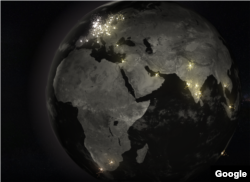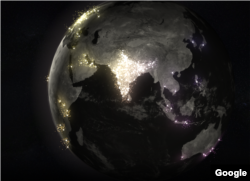A little over one year ago, the #metoo movement against sexual abuse began spreading on American social media.
Now, India is having a #metoo movement of its own.
Growing numbers of women are accusing powerful men in entertainment and media of sexual wrongdoing. In the past two weeks, a major Bollywood production house has shut down. A popular Indian writer has publicly apologized for past behavior.
And on Wednesday, a government minister resigned after 20 women accused him of sexual harassment. MJ Akbar, who is 67, has worked at the country’s leading newspapers and written several books. He was among the most influential people in Indian news media. His accusers are all female journalists who worked for him in the past.
Akbar has denied any wrongdoing. And, in answer, he has filed charges against the first woman to publicly accuse him. He accuses her of the crime of spreading false and damaging information.
The fast spread of #metoo in India began late last month. That is when Bollywood actor Tanushree Datta took legal action against actor Nana Patekar. Datta said Patekar sexually harassed her while the two were filming a movie. Patekar has denied the accusations.
Days later, a female comedian, Mahima Kukreja, made similar accusations against a member of the comedy group All India Bakchod. She said Utsav Chakraborty sent her unwanted sexual messages. The man apologized on Twitter, saying, “It’s a little too late, but I am sorry.”
Both women's accusations became leading news stories in the country. More and more women in media began telling their own stories to the press and online.
Some people have criticized the movement, saying it only concerns rich, educated people who live in cities.
Indian writer Tavleen Singh published an opinion story this week in The Indian Express. She wrote, “More than a hundred Indian women get raped every day, four out of 10 are children, and 94 percent of the perpetrators are relatives. Will this change, now that a handful of...educated journalists and actresses have come forward...?
"No, it will not,” she stated.
Yet, the movement appears to be spreading.
MeToo Rising is a project by the search engine Google. It presents a visual representation of #metoo searches around the world. The more that people in an area search for “me too” issues, the brighter that area shines.
The map lets users see search trends for #metoo beginning in October of 2017. That is when the movement first took off on social media.
For example, on October 16 of 2017, much of United States and parts of Europe were shining brightly. India appears mostly dark, except for a few areas near major cities.
But in recent days, all of India has been shining brighter than any other place on Earth -- by a lot.
On Friday, the project showed four of the five top-searching cities were in India.
Some women in India have said they chose to speak out after hearing the testimony of Christine Blasey Ford. The American professor in September publicly accused a nominee for the U.S. Supreme Court of sexually attacking her over 30 years ago. That nominee, Brett Kavanaugh, was confirmed earlier this month as a Supreme Court justice.
Rituparna Chatterjee is a journalist in India. She said that women around the world have been holding powerful men accountable for sexual wrongdoing. Now, she said, Indian women are ready to do the same.
Chatterjee told VOA, “The floodgates to women’s anger have been opened.”
I'm Caty Weaver.
And I'm Ashley Thompson.
Ashley Thompson adapted this story based on reporting by VOA's Anjana Pasricha, the Associated Press and additional materials. Caty Weaver was the editor.
____________________________________________________________
Words in This Story
harassment - n. making repeated unwanted attacks against someone
journalist - n. a person with the job of collecting, writing, and editing news stories for newspapers, magazines, television, or radio
comedian - n. a person who performs in front of an audience and makes people laugh by telling jokes or funny stories or by acting in a way that is funny
perpetrator - n. someone who does something illegal or wrong
testimony - n. something that someone says especially in a court of law while formally promising to tell the truth







